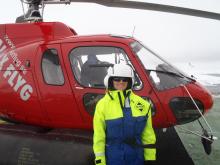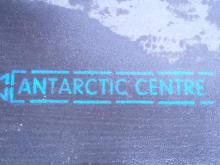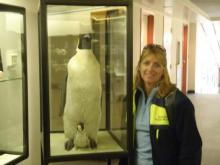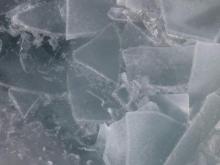Update
Check out the archived PolarConnect events with Anne Marie and research team from the Antarctic that were held on 6 January 2011 and 12 January 2011 here.
What Are They Doing?
As the Oden and the Palmer traveled towards McMurdo Station from Chile, international teams of researchers on board both ships investigated the summer sea ice, biology, oceanography, and biogeochemistry of the Amundsen Sea Polynya. Polynyas are areas of open water surrounded by sea ice and are very productive parts of the polar oceans where nutrients are rapidly exchanged between the atmosphere, ocean surface, and the deep sea.
The research team looked closely at the processes that control the production and destruction of greenhouse gases, and also on the role of sea ice microorganisms in this process. These studies added to the limited knowledge of these remote corners of the Antarctic Seas and lead to a better understanding of the interactions between the climate and the marine biosphere. Polynyas may be the key to understanding the future of polar regions since their area is expected to increase with warming in the polar regions.
Where Are They?
The team boarded the Swedish Icebreaker Oden in Punta Arenas, Chile, the southernmost city in South America, and then traveled across the southern Pacific Ocean to McMurdo Station, Antarctica, the largest research station in Antarctica. The Oden, a large research vessel and icebreaker, was contracted by the National Science Foundation to break a route through the sea ice into McMurdo Station. The Oden traveled in tandem with the United States research icebreaker, Nathaniel B. Palmer. A Swedish teacher also traveled as part of the team.
Latest Journals
Stephen Ackley is a research associate professor at the University of Texas at San Antonio, and has worked and conducted sea-ice research in Antarctica for more than 30 years. He previously worked with the Cold Regions Research and Engineering Laboratory (CRREL) and then joined the Department of Earth and Environmental Science at the University of Texas San Antonio in 2006. Ackley Point in Antarctica was named to honor Ackley for his outstanding sea-ice work by the U.S. Board on Geographic Names. Ackley Point is an ice covered point located near McMurdo Sound.

Dr. Patricia (Tish) Yager is an associate professor in marine sciences at the University of Georgia. Her expertise includes biological and chemical oceanography, marine microbial ecology and biogeochemistry. Her research focuses on the feedbacks between climate change and marine ecosystems. Her field research combines microbial ecology and community structure with inorganic carbon chemistry. She has spent several seasons working in Antarctica, and also studies microbial communities in the Amazon River. For the project in Barrow, Alaska, Tish will be the lead-PI responsible for project oversight, coordination, and synthesis. To learn more about Dr. Yager, please visit her faculty biography page.
Dr. Blake Weissling is a research assistant professor at the University of Texas San Antonio Department of Geological Sciences.





